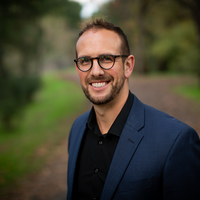
Andrew M Davis
Claremont School of Theology, Religion: Process Studies, Program Director, The Center for Process Studies
Andrew M. Davis is a philosopher, theologian and scholar of world religions. He is Program Director for the Center for Process Studies at Claremont School of Theology. A native of northern California, he was born and raised among the towering redwoods of Occidental and the meandering woodlands of Santa Rosa’s Bennett Valley. It was out these natural settings that his passion for the questions of philosophy, theology and religion first emerged. He holds B.A. in Philosophy and Theology, an M.A. in Interreligious Studies, and a Ph.D. in Religion and Process Philosophy from Claremont School of Theology. An educator and advocate of cross-cultural knowledge and religious literacy, his studies have led him to a variety of religious contexts and communities around the world, including India, Israel-Palestine, and Europe. He received the 2013 Award for Excellence in Biblical Studies, the 2017 fellowship with FASPE (Fellowships at Auschwitz for the Study of Professional Ethics) and the 2020 Presidential Award for Academic Excellence. He was recently nominated and elected as a fellow for the International Society of Science and Religion (ISSR). He is a poet, aphorist and author or editor of several books including How I Found God in Everyone and Everywhere: An Anthology of Spiritual Memoirs (2018); Propositions in the Making: Experiments in a Whiteheadian Laboratory (2019); Depths as Yet Unspoken: Whiteheadian Excursions in Mysticism, Multiplicity, and Divinity (2020); Mind, Value, and Cosmos: On the Relational Nature of Ultimacy (2020, nominated for the ISSR 2022 Book Prize); Nature In Process: Organic Proposals in Philosophy, Society and Religion (2022); and Process Cosmology: New Integrations in Science and Philosophy (2022).
Supervisors: Philip Clayton, Roland Faber, and Daniel A. Dombrowski
Supervisors: Philip Clayton, Roland Faber, and Daniel A. Dombrowski
less
InterestsView All (19)
Uploads
Papers by Andrew M Davis
beings, and human purpose as worshipful beings. The axiological foundations of God and the world constitute worship as “ontological gratitude”—a gratefulness for existence—which manifests itself in
a value-creative life.
beings, and human purpose as worshipful beings. The axiological foundations of God and the world constitute worship as “ontological gratitude”—a gratefulness for existence—which manifests itself in
a value-creative life.
In Metaphysics of Exo-Life, Andrew M. Davis offers a constructive philosophical response to historian Steven J. Dick’s “naturalistic cosmotheology” from within the process metaphysics of Alfred North Whitehead. Davis articulates how Dick’s six core principles of cosmotheology, developed over the last two decades, can be substantially deepened when inversely approached through Whitehead’s organic metaphysics. Detailing how Whitehead’s aesthetic cosmotheological realism addresses significant metaphysical problems wedded to Dick’s proposal, Davis develops six alternative principles that include Dick’s naturalistic intuitions, but also transcend key conceptual and explanatory limitations of his antirealist cosmotheology. The result is a deeper Whiteheadian cosmotheology in a universe pervaded with life, mind, and meaning.
In Appendix A, Davis makes a case for the inclusion of process theology in current and future discussions of God and extraterrestrial life by reviewing a variety of neglected statements made by past and present process philosophers and theologians, including core thematic affirmations that emerge. Appendix B republishes Lewis S. Ford’s pioneering 1968 article “Theological Reflections on Extraterrestrial Life” as the first sustained consideration of the topic from the perspective of process philosophy and theology.
Whitehead effectively saw that addressing the mechanistic rupture required an innovative, organic departure. His critique of abstractions, his refusal to bifurcate nature, and his famous formulation of the “fallacy of misplaced concreteness” unveiled the inadequacies of mechanistic thought and the interdisciplinary value of a new organic paradigm.
Written by scholars around the world, the proposals that comprise this volume follow in Whitehead’s footsteps in calling for an organic reconception of our philosophical, societal, and religious disciplines. Far from ousting creativity, experience, mind, feeling, and value, the organic shift represented in these chapters reintegrates what was lost in the mechanistic paradigm.
Amazon: https://www.amazon.com/gp/product/1793636397?pf_rd_r=2CDZ00P3W2JE5YJCPNKA&pf_rd_p=edaba0ee-c2fe-4124-9f5d-b31d6b1bfbee&pd_rd_r=c7f9867f-b588-47f2-9680-3ddc29529c75&pd_rd_w=nveGa&pd_rd_wg=aYtqt&ref_=pd_gw_unk
Video: https://www.youtube.com/watch?v=F0m9aMRC9S0&t=3s
Purchase Here: https://wipfandstock.com/depths-as-yet-unspoken.html
Or on Amazon: https://www.amazon.com/Andrew-M.-Davis/e/B076V1FYP5/ref=ntt_dp_epwbk_0
Edited by Roland Faber, Michael Halewood, and Andrew M. Davis, Propositions in the Making articulates the newest reaches of Whiteheadian propositions for a postmodern world. It does so by activating interdisciplinary lures of feeling, living, and co-creating the world anew. Rather than a “logical assertion,” Whitehead described a proposition as a “lure for feeling” for a collectivity to come. It cannot be reduced to the verbal content of logical justifications, but rather the feeling content of aesthetic valuations. In creatively expressing these propositions in wide relevance to existential, ethical, educational, theological, aesthetic, technological, and societal concerns, the contributors to this volume enact nothing short of “a Whiteheadian Laboratory.”
As these diverse spiritual memoirs testify, for many today, the spiritual journey has lead to the discovery of a divine reality that, it turns out, we already inhabit, one that encompasses us all. Sometimes called "panentheism," this relational and participatory vision is allowing for a "return to God after God" and thus a continuation of the spiritual journey. Such a God is not found in some people and some places, but in everyone and everywhere.